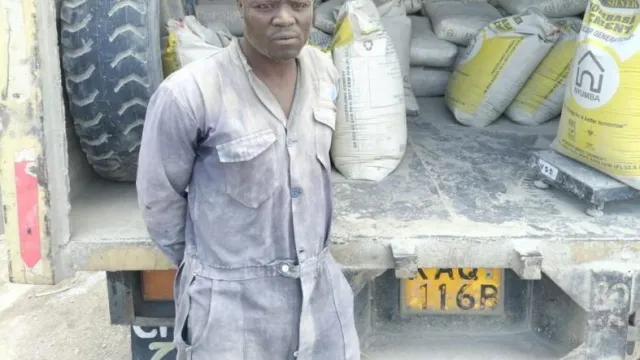Kenya turns into a counterfeiters’ paradise

Following a crackdown on cartels involved in the adulteration of major brands of cement, 13 suspects were arrested and eight loaded lorries detained, and a seizure amounting to 1,774 bags of compromised weights.
A quick glance at the Directorate of Criminal Investigations (DCI) X (formerly twitter) account shows near-daily updates that expose rampant infiltration of fake goods into Kenyan markets. While each post announces another sting operation, another burst up, another seizure, this trend is a body blow to consumer trust in East Africa's largest economy.
Nearly every day in the past one week, the DCI has posted the capture of substandard or uncustomed goods worth millions of shillings destined to various parts of the country.
The latest operation on Sunday in Kanduyi Division, Bungoma County, saw officers from Bungoma police station, in collaboration with Kenya Plant Health and Inspectorate Service (KEPHIS), apprehend Hillary Wafula and seize 124 bales of expired maize and bean seeds.
"The raid extended to Kakamega County, where officers arrested John Kiniale, Mercy Merun and Felix Oyath at Harambee Trading Centre. These suspects led the officers to three residential houses, where about 70 tonnes of maize, 10 tonnes of beans, and 50 bags of 50 kg fertilizer were seized.
"On inspection, all the goods were confirmed to be expired and had previously been condemned and marked for destruction," the DCI explained.
In yet another case, on Saturday, in a multi-agency operation involving the Kenya Revenue Authority (KRA) the DCI reported the seizure of a lorry transporting 1,135 boxes of Supermatch cigarettes, each box containing 5,000 sticks along the Kitengela-Namanga road. The value of the cargo was estimated at KES56 million.
"In response to a troubling surge in uncustomed goods infiltrating the market, which undermines legitimate businesses and harms consumers, the Directorate of Criminal Investigations has decisively ramped up operations to eliminate these illegal products," DCI noted in its update.
"The lorry and its illicit cargo are now securely detained at Isinya Police Station as detectives continue to probe how this vehicle managed to breach authorized border checkpoints equipped with operational scanners. This incident underscores the ongoing commitment to uphold the law and protect the integrity of the market."
Repackaged cement
The highlight of these burst ups was however recorded on December 20th and 21st, 2024, when the DCI reported the arrest of 13 suspects were arrested and seizure of eight trucks loaded with a total of 1,774 bags of cement whose weight was suspected to have been tampered with.
The hotspots where these illegal activities, which involve the adulteration of genuine cement with the introduction of pozzolanic dust thereby reducing the quality are carried out mostly in Athi River, Syokimau and Kitengela.
According to the DCI, one truck registration KCV 426R was loaded with 222 bags of cement all of them weighing 43.5Kg, a distant weight from the standard 50kg. Another truck KBG 906A contained 83 bags, most weighing 39.65kg while KDH 267A contained 157 bags with the lowest weighing 39.45kg and the highest 50.5kg.
"The repackaged cement has not only been found to be way less the declared weight of 50kg, but also contained non-cementing material such as pozzolanic dust which greatly reduces the quality of cement," explained DCI.
Truck registration number KCK 928T contained 251 bags with most of them weighing 38.1Kg while KAQ 116B contained 214 bags weighing as low as 41.8kg. Some bags weighed as high as 58.3kg, added the DCI.
The investigation, which puts to question the kind of construction materials in use exposed that the truck KAQ 600B was loaded with 262 bags of cement with the lowest weighing 30.1kg and the highest 51.9kg.
"Such illegal activities by greedy businesspersons jeopardize the safety of Kenyans especially the millions who live in rental apartments, given the many tragic incidents of collapsed buildings."
KCS 951P contained 480 bags with the lowest weighing a paltry 17.05kg and most of the other bags weighing under 40kg.
What's more, some of the packaging bags, and which do not originate from the manufacturers, were dated 2025. Other packaging bags didn't have the correct corporate colours of the cement manufacturers.
"Investigations have so far established that rogue employees (particularly drivers) of the affected companies have been colluding with greedy businesspersons strategically placed along the transport routes, who illegally repackage the cargo and share the benefits amongst themselves. The perpetrators, most of whom own hardwares, then hawk the substandard cement to unsuspecting customers."
Prevalence of counterfeits in Kenya
According to the Anti Counterfeit Authority (ACA), about 80 percent of 10 products that are categorised as fake or substandard enter Kenya as imports. The local manufacturing industry is equally to blame for the manufacture of counterfeits and accounts for about 20 percent of the share of substandard goods in circulation.
Data from the ACA shows that the watchdog has launched operations with multiagency teams that has led to the seizure of KES400 billion worth of counterfeited products since 2010.
In its 2020 survey, the ACA estimates that Kenya loses about KES800 billion shillings annually through fake goods trade, of which counterfeits account for nine percent, or just about KES72 billion.





